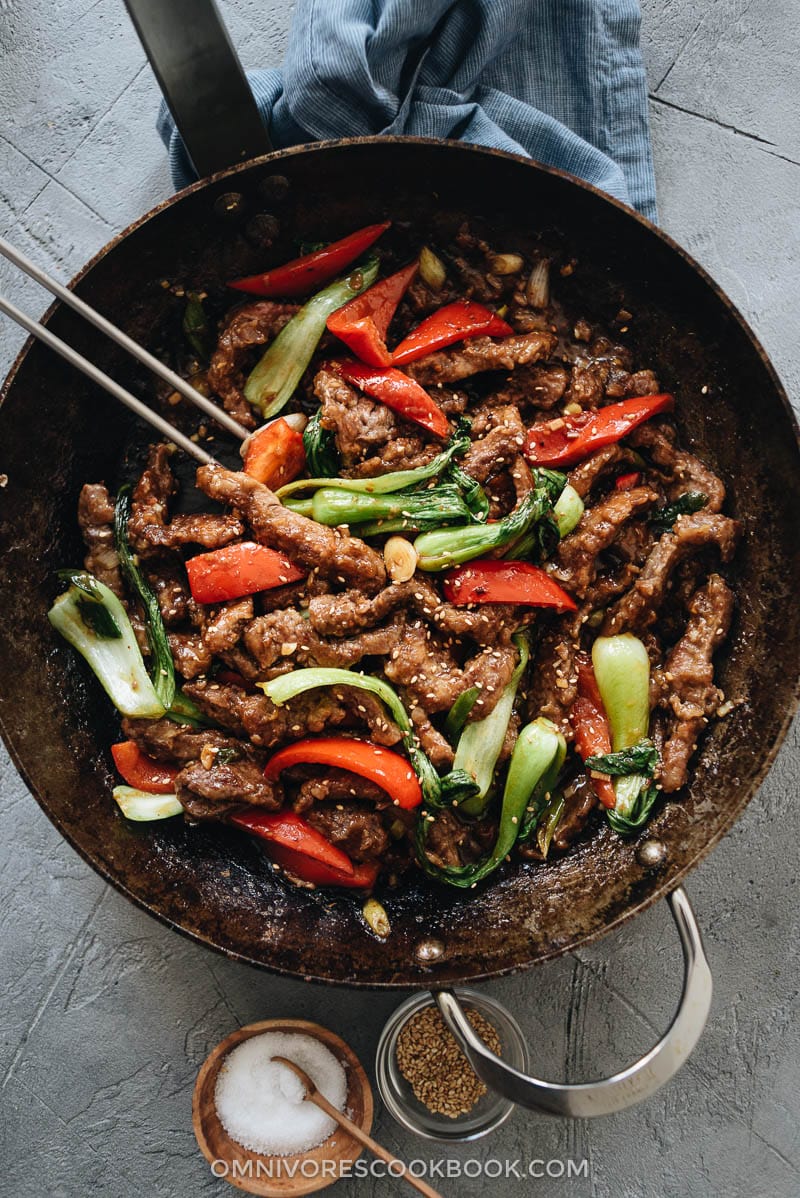
Ginger Beef is an absolute classic from the hot and humid southwestern part of China. While other regions tend to tone down the spice and seasoning, Sichuan and other nearby provinces like their cuisine tongue-tingling and re-energizing. Nothing embodies this more than the ginger beef stir fry.
This is a fantastic take on the explosive flavors of typical Sichuan cuisine for anyone who is not keen on full-blown spiciness. Not to mention, it’s also a party of textures – the beef’s tenderness wonderfully complements the crunchy bell peppers and tender baby bok choy. The sauce that brings it all together is the perfect balance of sweet, spicy, sour, peppery, and umami all in one.
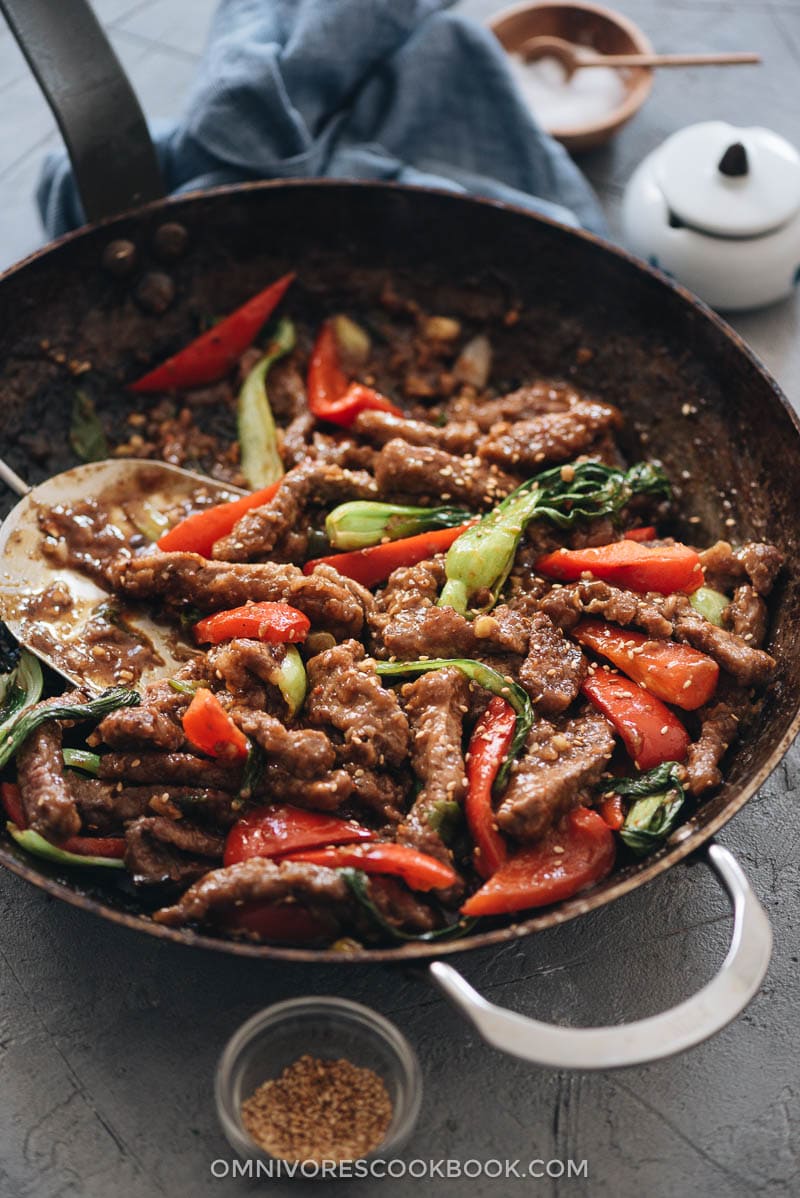
Ginger beef cooking notes
1. Best cuts of beef to make stir fry
Try to get a good flank steak from your local butcher, as it will be of the best quality and thus deliver the tastiest results. Flank tends to be lean and boneless with lots of intense beef flavor. It is best when marinated and sliced thin for stir frying.
On the other hand, if you live in a place where flank steak is difficult to find or expensive, you can replace it with skirt steak or fajita cuts.
For an even cheaper alternative, you can use chuck roast or brisket. But remember, these cuts can be quite tough when stir fried. In this case, you should use the formula in my Orange Beef recipe, where I use baking soda to further tenderize the meat to create the desired soft texture.
2. How to slice the beef for stir fry
Always slice against the grain, and try to create a consistent thickness and size with your cuts. In this recipe, I used beef strips instead of thin slices, to create a meaty texture.
To cut the beef, first, I identified the direction of the grain. Then I sliced along the muscle lines to create 2 small pieces. And I cut perpendicular to the grain of each strip, to create evenly sized slices that are about 1/2” (1 cm) thick and 2” (5cm) long. Then I flipped the slice and cut them into two even strips.
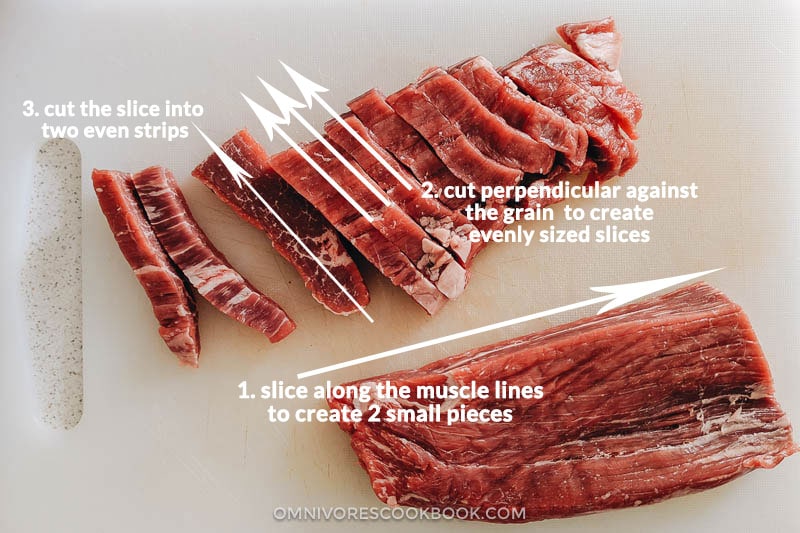
3. The secret formula to create crispy tender beef without deep-frying
Chinese restaurants deep fry the beef to create that heavenly crispy crust. But that uses tons of oil and is very messy to make. Not so practical in a home kitchen.
Here is a much easier approach.
I use my own formula with the combination of salt, oil, egg and cornstarch to coat the beef. Then you only need about 1/3 cup oil to pan fry the beef to get a crispy and juicy result.
To ensure even cooking and speed up the process, I usually add all the pieces into the pan and spread them out using a pair of chopsticks (a spatula would work too!). Leave the meat to sear in the pan without touching it, until the bottom is browned. Then flip the beef to brown the other side.
Your beef will end up quite crispy with much less oil.
Prep & workflow
Before you start cooking, you should have these bowls ready near your stove:
- Bowl of aromatics: green onions, ginger, garlic
- Marinated beef coated with cornstarch
- Mixed sauce
- Sliced pepper and bok choy in a big bowl.
If you organize your ingredients in groups, the stir fry process will be so much easier.
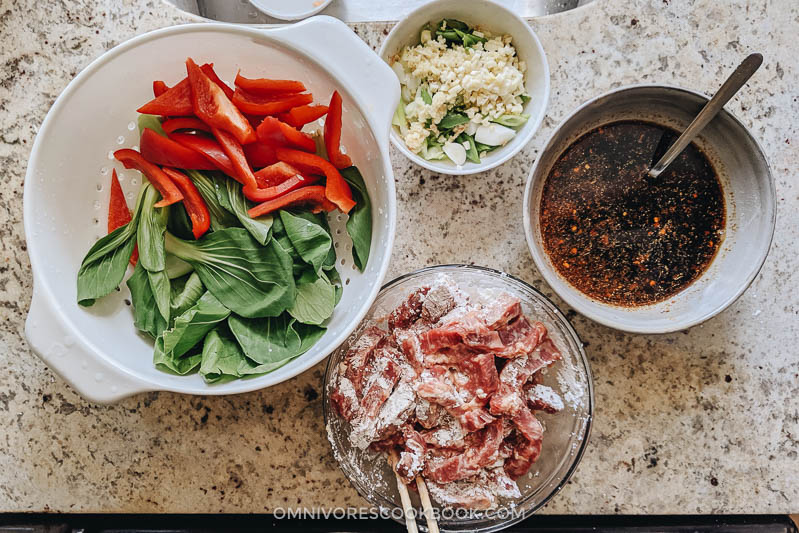
To make the ginger beef:
- Pan fry the beef and transfer the cooked beef onto a plate.
- Stir fry the aromatics until fragrant.
- Add the pepper and bok choy for a quick saute
- Thicken the sauce and add back the beef.
Seems pretty easy doesn’t it?
That’s because we’ve grouped the ingredients together to make the workflow simpler.
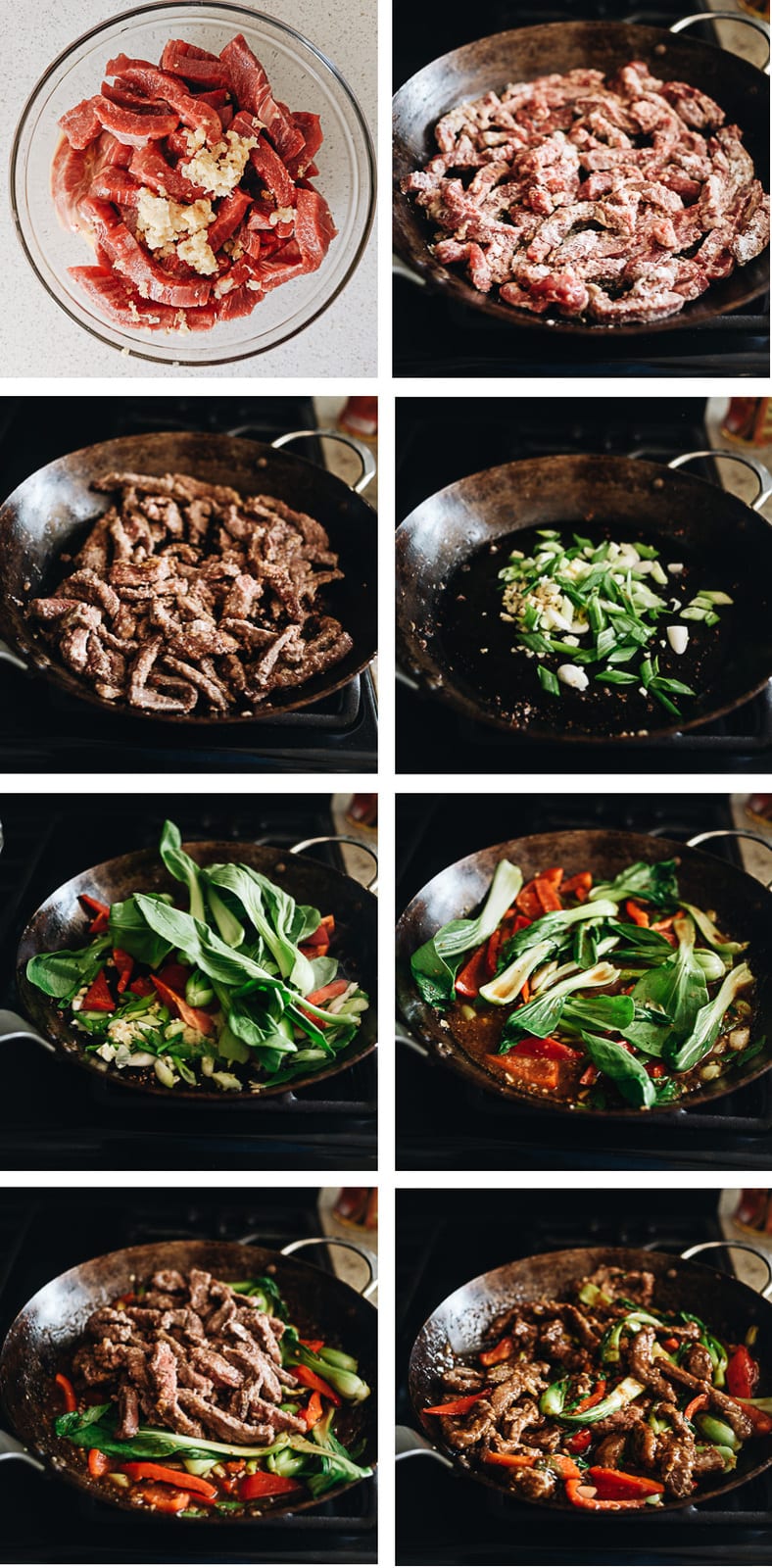
Pair this stir fry with freshly steamed rice to soak up the deep, arresting flavors of the sauce, and you’ll have a princely takeout favorite with ten times the taste!
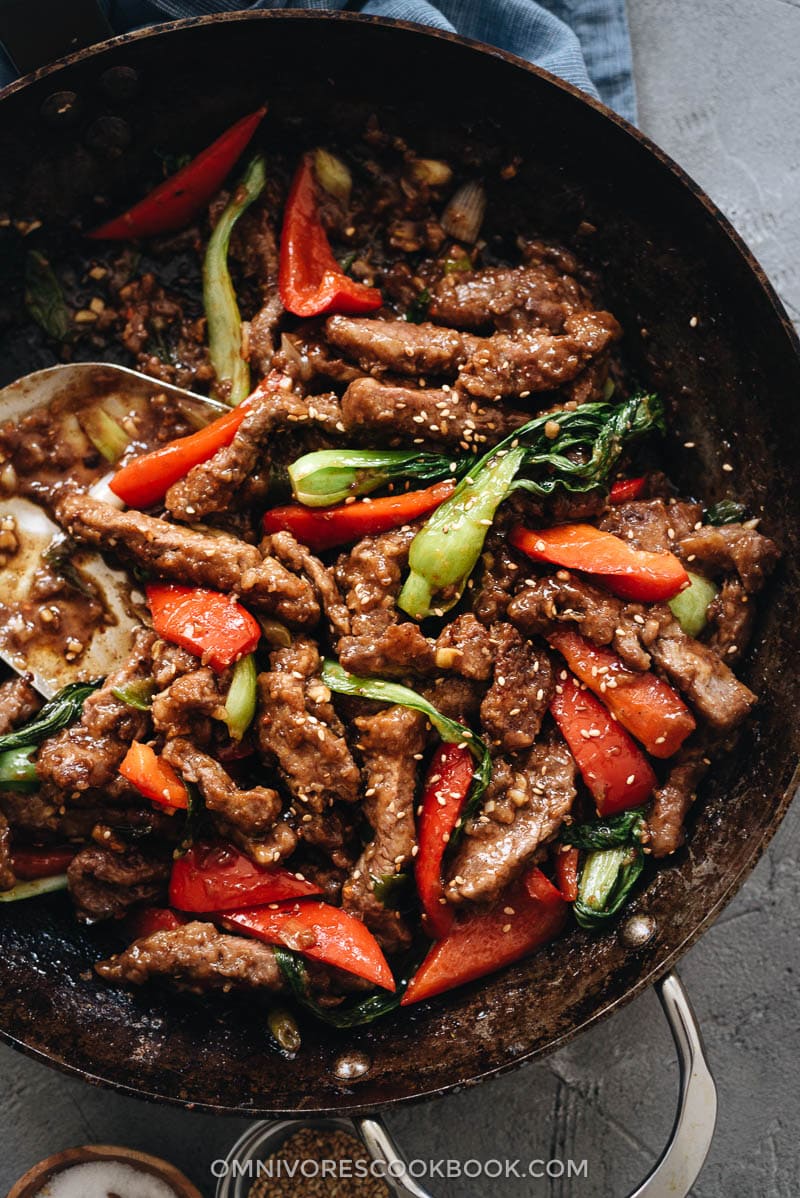
More delicious beef recipes
- Real-Deal Szechuan Beef Stir Fry
- Easy Beef Fried Udon (Yaki Udon)
- Chinese Beef Stew with Potatoes
- Mongolian Beef (Without Using a Wok)
- Chinese Beef Chow Mein
- Beef Satay
If you give this recipe a try, let us know! Leave a comment, rate it (once you’ve tried it), and take a picture and tag it @omnivorescookbook on Instagram! I’d love to see what you come up with.
Chinese Cooking Made Easy
Are you new to this website? This free email series is a great place to start. I’ll walk you through a few of my most popular recipes and show you how and why they work. You’ll quickly start to cook better Chinese food in your own kitchen.
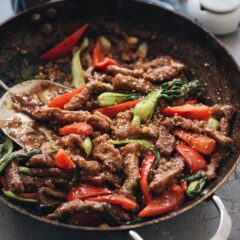
Ginger Beef Stir Fry
Ingredients
- 1 lb (450 g) flank steak , cut to 1/2-inch thick strips
- 1/3 cup cornstarch
Marinade
- 1 egg , beaten
- 1 tablespoon finely grated ginger
- 1 tablespoon peanut oil (or vegetable oil)
- 1/2 teaspoon salt
Sauce
- 1/3 cup broth (beef, chicken, or vegetable)
- 3 tablespoons Shaoxing wine
- 3 tablespoons soy sauce
- 2 tablespoons Chinkiang vinegar
- 3 tablespoons sugar
- 2 teaspoons cumin powder
- 1 teaspoon red chili pepper flakes
- 1 tablespoon cornstarch
Beef and stir-fry
- 1/3 cup peanut oil
- 3 green onions , chopped
- 2 cloves garlic , thinly sliced
- 1 thumb ginger , sliced
- 1 bell pepper , sliced
- 2 baby bok choy , quartered
Instructions
Marinate the beef
- Beat the egg in a medium-sized bowl. Add the sliced beef, ginger, vegetable oil, and salt. Mix well and let marinate for 15 to 20 minutes while preparing the other ingredients.
Mix the sauce
- Combine everything for the sauce in a big bowl and mix well.
Stir fry
- When you’re ready to cook, add the cornstarch. Stir to coat the beef, until it forms an uneven coating with a little dry cornstarch left unattached.
- Heat the oil in a large nonstick skillet (or a cast iron paover medium-high heat until hot. Add the beef and spread it into a single layer in the skillet. Separate the beef pieces with a pair of tongs or chopsticks.
- Cook without touching the beef for 2 to 3 minutes, or until the bottom turns golden. Flip to brown the other side, 1 to 2 minutes. Transfer the beef to a big plate and remove the pan from the stove. Let cool for 2 to 3 minutes.
- Place the pan back onto the stove and turn to medium heat. You should still have 1 to 2 tablespoons of oil in the pan. If not, add more.
- Add the green onion, ginger, and garlic. Stir a few times to release the fragrance.
- Add the bell pepper and baby bok choy. Stir and cook for 1 minute.
- Stir the sauce again to dissolve the cornstarch completely. Pour into the pan. Stir and cook until it thickens a bit.
- Add back the beef pieces. Stir to coat the beef with sauce.
- Transfer everything to a plate immediately and garnish with roasted sesame seeds, if using.
- Serve hot over steamed rice as a main dish.
Nutrition

Did you make this recipe?
I’d love to hear how it turned out for you! Please take a moment to leave a 5-star rating ⭐️ and share your thoughts in the comments further down the page. It really helps others discover the recipe too.

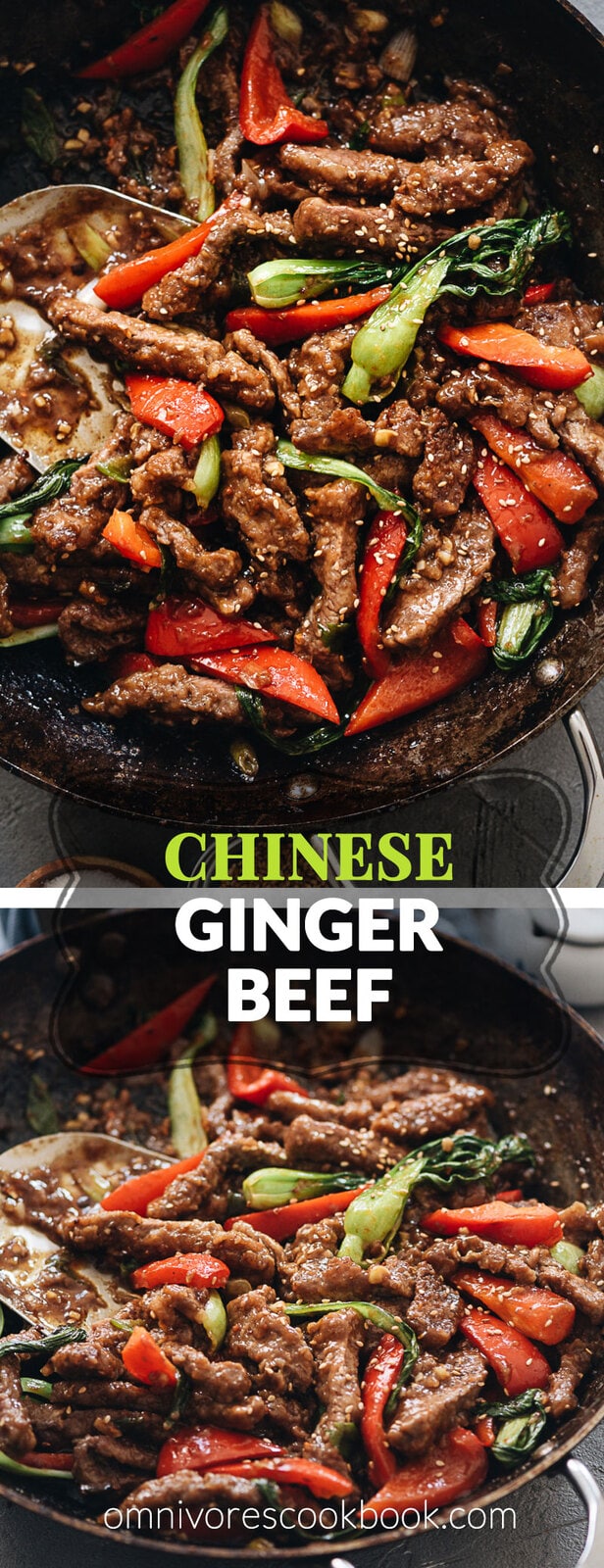
lynne lasser
this was really great, thank you!
Kurt
Silly question, perhaps… but how to best slice the ginger for this? I assume not julienned; any recommendation for how thick? I’m a little concerned (though, yeah, I know this is “ginger beef”) of having it be overwhelming in a mouthful.
Maggie Zhu
Hi Kurt, the ginger is very thinly julienned, about 1″ long, 1/16″ thick. Sorry it’s not very clear in the recipe.
It’s a very common cutting method in Chinese cooking. Once you cook the ginger in the oil, they will become tender and won’t taste too spicy.
If you’re concerned about the texture, I would use 1 heaping tablespoon minced ginger, so you won’t get a mouthful of ginger slices.
Kurt
Oh, thank goodness :-)… and thanks for the quick reply. I’m not a complete novice at Asian cuisine, but it’s not TOTALLY uniform re julienne and I’ve encountered exceptions on occasion, though seldom. I wouldn’t have asked, but the first time I make someone’s recipe I like to adhere 100% to the intent and strike out on my own subsequently. This is a great site… thank you again.
Nick S.
I like this recipe, but seriously I taste no ginger. I responded previously. I never came across cumin in any Chinese recipe before. It makes me curious. I ground up cumin seed and that’s all I taste. I don’t taste any ginger. I’m thinking next time I do this, just skip the cumin.
Maggie Zhu
Hi Nick, thanks for leaving a feedback! To answer your question about cumin, it’s a very common spice in Xinjiang cooking (mid-west Chinese, heavily influenced by muslin culture) and northern Chinese cooking (where I grew up). For example, check out these pages:
https://omnivorescookbook.com/cumin-lamb/
https://omnivorescookbook.com/xinjiang-lamb-skewers/
https://omnivorescookbook.com/cumin-lamb-noodles/
I like this spice and was intended to use it as a hidden flavor in this recipe, but I do think it could overpower the ginger. It’s totally OK to skip it so the ginger flavor comes through more.
Kristi odonnell
I’ve been making this recipe for years and we love. Made it with pork (our favorite), beef, and chicken (least favorite). But we had our meatless day and lions mane mushroom. So I said, screw it. Try it. And I did. It was amazing. If you are looking for a veg option, this is great option. I did add more veggies like Japanese eggplant, cabbage, okra, carrots, peas, and snow peas.
Susan
This is a great recipe…I think a correction needs to be made as the grated ginger isn’t mentioned in step 1 of the “Marinade the beef” instruction Only the egg, salt and oil are mentioned. Are we supposed to include the grated ginger, I assume?
Maggie Zhu
Yes, the ginger should be added into the marinade. I just updated the recipe to reflect the correct instructions.
Glad to hear you enjoyed the dish and thanks for leaving a positive review 🙂
Steaphan MacAulay
Ginger beef is actually Canadian, not Chinese. It was invented in Calgary, Alberta. Looks like a great recipe and I can’t wait to try it.
Come here if you want it done right!
Whitney
This recipe turned out absolutely fabulous! I ended up tripling the recipe as I have a lot to feed. It worked out just beautifully. I also chose the gluten free options in the recipe since I have celiac. Right before serving, I tossed some rice noodles in. Everyone loved it, thank you so much for sharing!
Barry
I was very leery of the cumin (I even thought it may have been accidentally added), but I followed the recipe to a T. It was very good, but I didn’t think the cumin helped the dish. I made it again, omitting the cumin and it was amazing. I have nothing against cumin, I have just never had it in chinese cooking, and don’t think it really fits. I have made this recipe at least 20 times since – I have used shaoxing wine, sherry and regular white wine, and didn’t notice any difference. I have used chinkiang vinegar and rice vinegar and didn’t notice any difference. This recipe also works well with chicken, but it’s definitely better with beef. I have since made one small change – I cut the sugar in half and add a grated carrot. Definitely a restaurant-quality dish. Well done.
B. Shepherd
This was an outstanding dish. So well balanced. This is easily my new favorite dish!
Steve K
Wow! This was excellent. I followed the recipe exactly as written and it came out perfect. Better than take-out.
Getta
This recipe is delicious – everything about it. Another fab recipe.
tw
Great recipe. I liked the addition of the egg 🙂
Nancy
Cumin is my favorite spice and to have it in ginger beef was amazing! I also haven’t seen cumin in Chinese cooking but it sure does go well with the ginger. Excellent recipe!
Avril O’Neill
Hello, I’m interested in the nutritional facts that you provide. Are the calories per serving? Thanks,
Avril, ON Canada
Maggie
Yes, it is calories per serving.
Cherokee Lawrence
Wow! I made this last night and my husband I are now fans of yours. It was very good using the rice wine vinegar and cooking wine that I had but I am going out tomorrow to get the exact cooking wine and vinegar you recommend as I can only imagine how much tastier this will be! I am now looking for my next recipe to make from your website. Thanks heaps!
Kristi O’Donnell
I hope you get this comment. I’m attempting to make this tonight. Very excited, but do not have the recommended shioxing wine. What would you recommend for its place? I do not have sake. I have. White wine. I also saw whiskey or vodka can be used.
Maggie
A teaspoon of Vodka would be perfect! Happy cooking and let me know how it goes 🙂
Kristi O’Donnell
It was amazing! This is definitely on the list for future cooking. Thank you.
Nick S.
We made this last night. It was good, but I’ve never had cumin in any Chinese recipes before. Just to clarify, for this recipe “cumin power”=”ground cumin seed”? I normally see this spice used in American southwest cooking. We did cut the cumin in half because we use fresh ground cumin seed . I was thinking that maybe this was supposed to be cilantro leaves. It was tasty to bite into hunks of ginger 🙂
Yegor Timofeyenko
This recipe instantly became one our favorites. I did not know until now how well ginger and cumin complement each other. The overall flavor is very delicate and balanced!
I have made the recipe three times already. Once using the Maggie’s crispy pan-frying method, another time using a traditional Chinese stir-fry method, and a third time using baked chicken instead of beef. The only modifications I have done were a matter of personal preference, such as halving the starch amount when using crispy pan-frying method (but keeping the starch amount the same when using baked chicken).
The recipe is truly perfect the way it is, and is something you would expect to be served in the best Chinese restaurants. Thank you, Maggie, for sharing this tasty recipe!
Carolyn
Cumin is an unusual ingredient in Chinese Cooking. How obvious is the flavour of Cumin in this recipe?
Maggie
Hi Carolyn, cumin is actually a very common ingredient in Norther Chinese cooking (which is less popular than Southern Cantonese cuisine) and it’s a staple for my home. The cumin powder here is on the background but you can taste it. If you don’t like the taste, you can reduce it to 1 teaspoon or skip it all together.
Annetjie
I love this recipes